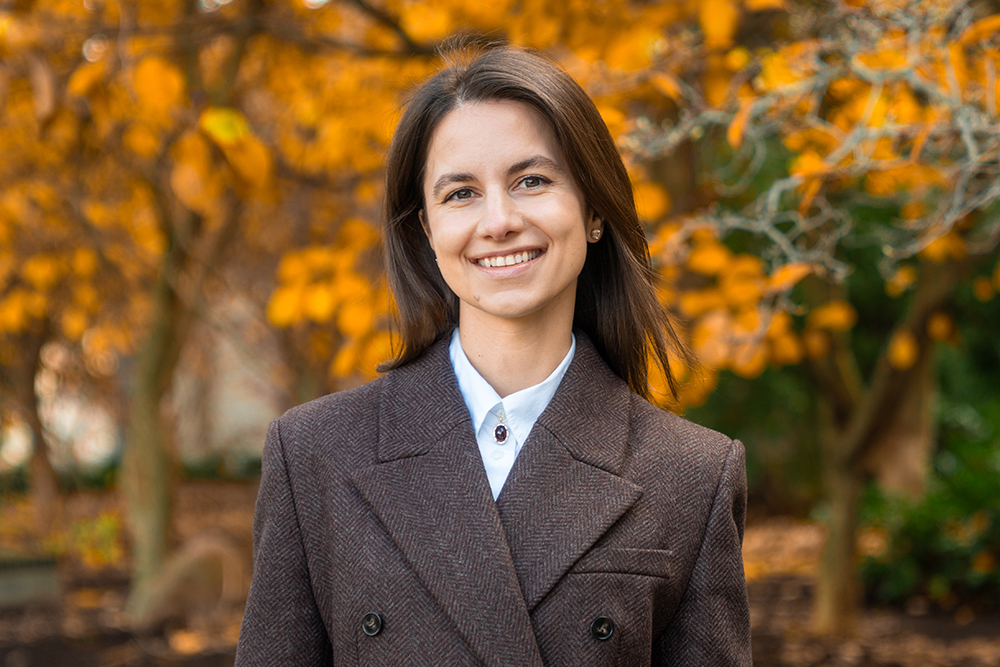Media
Contact
Communications Specialist
Faculty of Engineering
Spencer Engineering Building
Room 2072
Western University
Tel: 519-661-2111 ext. 87015
Email: engineeringcomms@uwo.ca
Daria Popugaeva, whose research focuses on water treatment in the Arctic and sub-Arctic, selected for the WE-Empower! program

Daria Popugaeva, PhD'19, research engineer at Western Engineering, studies water treatment solutions for Arctic and sub-Arctic regions and was recently selected for the WE-Empower! program. (Jacob Arts/Western Enginee
Daria Popugaeva, PhD'19, a research engineer in the department of chemical and biochemical engineering at Western University, was recently selected to participate in WE-Empower!, a program that brings together innovative and entrepreneurial women to provide free mentorship and training in entrepreneurship, research commercialization, and intellectual property protection.
We spoke with Popugaeva about her selection, her research, and how the program will help her bridge the gap between research and real-world applications.
How did you feel when you learned you were selected to participate in the WE-Empower! program?
Daria Popugaeva (DP): I was happy to learn I was selected to be part of the new WE-Empower! cohort. The program complements my research perfectly, providing valuable skills and a valuable network. Both personally and professionally, this program feels like an exciting step forward. I believe programs like WE-Empower! play a meaningful role in advancing and supporting women in research and innovation by providing access to mentorship, training, and a professional network.
Which areas of the program are you most excited about — entrepreneurship, research commercialization, intellectual property training or mentorship?
(DP): I am particularly curious about the research commercialization component of the program, as it provides valuable insights into effectively translating research ideas into real-world applications. So far, most of my work has been rooted in research. My participation in the WE-Empower! educational program gives me an opportunity to learn the fundamental strategies in commercialization and entrepreneurship, bridging the gap between research and real-world application. Additionally, I appreciate the mentorship and networking opportunities, thanks to the amazing mentors, peers and fellow participants!
Can you describe your current research and what inspired it?
(DP): My research is centred on water treatment solutions suitable for the Arctic and sub-Arctic regions. Our team looks at exploring cryopurification, an innovative technology that leverages the natural process of water freezing to remediate contaminated mine water in Yukon, Canada. The beauty of the technology lies in its nature-inspired approach, as it makes use of the cold climate conditions rather than fighting against them.
The project is a collaboration between Western Engineering and Core Geoscience Services Inc. (CoreGeo), a Yukon-owned company. I am fortunate to be part of an amazing team, including Lars Rehmann, professor in the department of chemical and biochemical Engineering at Western University, Konstantin Kreyman, research engineer in the same department, and the CoreGeo team, including its principal environmental geochemist, Ethan Allen.
What stage is your research currently at — are you exploring applications, prototypes, or potential partners?
(DP): This February, our research reached the stage of pilot-scale testing in Whitehorse, Yukon, and the Western and CoreGeo team plans to continue this work in the upcoming winter seasons. It is exciting to see our work recognized – we have been invited to the 53rd Yukon Geoscience Forum and Trade Show this November. I look forward to heading up North to share our findings in the “Yukon Needs in Mine Remediation & Restoration” section and represent Western Engineering and CoreGeo at the forum in Whitehorse this month.
After completing the WE-Empower! program, what are your next goals?
(DP): Scaling up cryopurification technology and testing it directly at the mine site in Yukon is one of the next steps within the project. Beyond that, the next exciting goal is to advance the technology towards commercialization as an alternative water treatment process with potential investors from the Canadian mining industry, Yukon First Nation Communities and/or other potential users of the technology.
What advice would you give to other women researchers interested in translating their research into impactful innovations?
(DP): For researchers, I would encourage you to trust the value of your work and take that first step to share it beyond the lab. One lesson I keep reminding myself of is how important it is to surround yourself with people you can lean on – those who have confidence in you, your abilities, and your potential.

